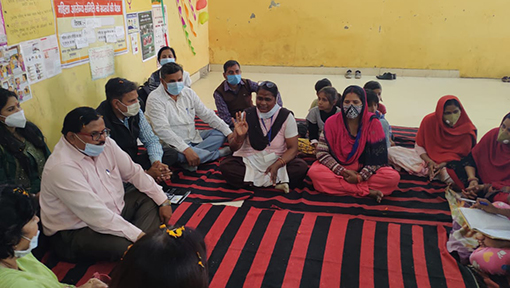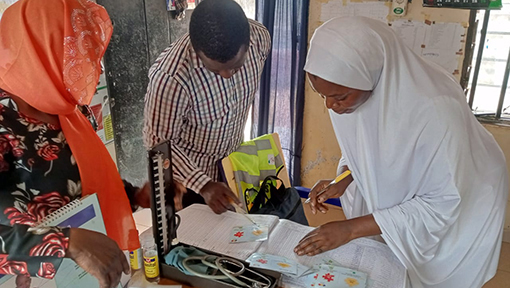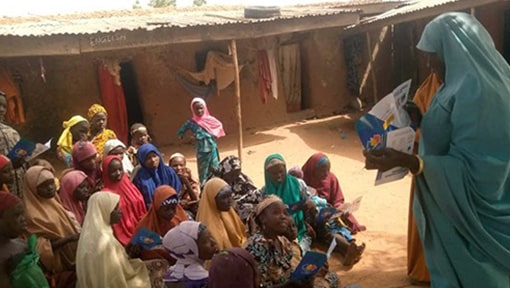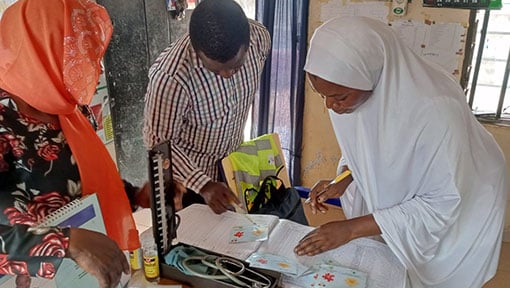Strengthening the Linkages Between Community Structures and the Health System in Moradabad, Uttar Pradesh
Contributors: Rajiv Kumar,1 Anupam Anand, Meenakshi Dikshit and Deepti Mathur

ASHA Heerawati attends a MAS meeting in Moradabad.
When The Challenge Initiative (TCI) in India engaged the city of Moradabad in May 2018, most Accredited Social Health Activists (ASHAs) had little knowledge of family planning – especially long-acting spacing methods – due to limited or no training. For them, family planning meant female sterilization. They rarely engaged with Mahila Arogya Samitis (MAS) to seek support from these women’s support groups in addressing myths and misconceptions related to family planning and tackling social barriers (including the ones posed by gatekeepers) that these community groups could help influence. At the same time, MAS also had limited knowledge and information about family planning.
As a result, family planning uptake in Moradabad was low, given very few women knew much about the variety of family planning methods available to them, let alone felt supported and informed to make a decision on the matter. An ASHA named Heerawati described the situation before she engaged with TCI and how TCI training and coaching empowered her:
Previously, I did not have much confidence in discussing family planning with women of my area as I did not know much about it. Like others in the community, I feared IUCD (intrauterine contraceptive devices). In 2019, TCI organized a two-day orientation on FP where I learnt about all the methods, their side effects, and ways of handling client’s myths and misconceptions. I clarified my doubts on IUCD, injectables and others. I learnt how MAS members can be helpful in dealing with mothers-in-law who sometimes pose difficult questions or prevent adoption of FP by a young woman of their house. I felt a rush of confidence in me.”
Heerawati was applauded in an ASHA-ANM monthly meeting, where she shared how with the help of MAS members she helped a woman adopt a family planning method of her choice:
I remember that during one of my routine household visits, I informed a young woman Moni about family planning choices for spacing between children. However, her mother-in-law stopped her from adopting any family planning method. I tried counseling her mother-in-law on the advantages of family planning for a young woman, but she did not listen to me. Soon, I learnt that Moni was pregnant with her second child. I was dismayed as I had seen Moni as a frail woman. After her second delivery, I spoke to Mahila Arogya Samiti members and requested them to counsel Moni’s mother-in-law so that she does not conceive yet again and get burdened. MAS members invited Moni and her mother-in-law in their next group meeting where they counseled both of them. Moni soon visited and met the UPHC doctor who explained the basket of choices to her. I kept on following up with Moni and assured her that the side effects of any FP method are temporary and there is no need to be afraid of any method as it will improve her life. Finally, Moni asked me to help her avail injectable contraceptive.”
This story motivated other ASHAs to work with MAS members in their communities to counsel women to adopt family planning methods of their choice. Heerawati has so far successfully motivated more than 100 eligible couples and is one of the expert ASHAs at her urban primary health center (UPHC), Majholi.
As a result of these efforts to strengthen linkages between the community and facility, the overall uptake in family planning services at the city level for Moradabad has improved by 97% – from 7,694 family planning users at the time of baseline to 15,136 users as of June 2021. At the same time, this represents a 197% increase at the UPHC level – from 4,266 family planning users at baseline to 12,649 users as of June 2021.

Increase in annual family planning client volume. (Source: HMIS)
1 Rajiv Kumar is Divisional Urban Health Consultant, Moradabad






